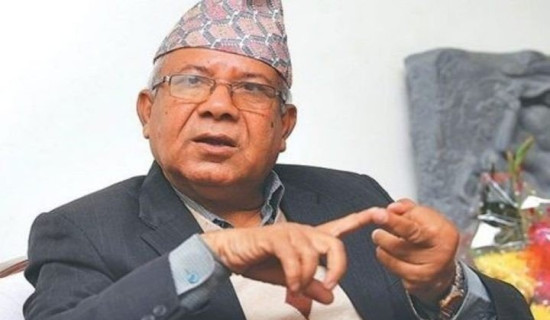- Monday, 15 December 2025
How Air Pollution Affects Health
In a recent research webinar organised by the Nexus Institute of Research and Innovation (NIRI), a compelling presentation delved into the topic "Chronic Obstructive Pulmonary Disease (COPD): Public Health Measures of Prevention." Esteemed experts in the field shared their insights, engaging in thoughtful discussions and answering questions from participants and listeners. Dr. Om Kurmi, Director of the Department of Natural and Applied Science at NIRI and Associate Professor at Coventry University in London, delivered a meticulously researched presentation on the causes and consequences of air pollution, proposing solutions and suggesting avenues for further research.
Adding a policy perspective, Dr. Krishna Prashad Poudel, Chief of the Policy Planning and Monitoring Division at the Ministry of Health and Population (MOHP), provided invaluable insights, reflecting on the current situations of prevailing air pollution, associated problems, and potential mitigations. The presentation unveiled a disconcerting narrative of lung health in Nepal, exacerbated by traditional practices entrenched in rural areas. A significant concern emerged — the use of firewood, haystacks, and animal dung as primary cooking fuels, disproportionately affecting women. Dr. Kurmi's research underscored the detrimental impact on lung development, especially among females.
As lungs continue to grow until the age of 20 for females and 25 for males, exposure to air pollution impedes this growth, resulting in an array of respiratory issues, notably asthma.
In many Nepali households, particularly in rural settings, the use of wood or dried animal dung for cooking persists. While deeply rooted in tradition, this practice exposes individuals, particularly pregnant women, to a plethora of health risks. The added deficiency of essential vitamins A, D, and E intensifies these risks, rendering individuals more susceptible to respiratory problems and even cataracts.
Silent killer
The gravity of the issue is underscored by the seeming lack of awareness and priority at both governmental and community levels. As the population burgeons, the number of deaths attributed to respiratory issues remains disproportionately high. The webinar brought to light the stark reality that air pollution annually claims more lives in Nepal than traffic accidents, diabetes, and high sugar levels combined. Reflecting on the discourse and discussions in the presentation, I drew parallels with Yuval Noah Harari's profound observations in "21 Lessons for the 21st Century." Harari's data resonates with a global crisis — air pollution claims a staggering seven million lives annually, surpassing casualties from traffic accidents, terrorism, and diabetes.
He writes, "Since September 11, 2001, each year terrorists have killed about 50 people in European Union, about 10 people in the United States… In contrast, each year traffic accidents kill about 80,000 Europeans, 40,000 Americans… and 1.25 million people together. Diabetes and high sugar levels kill up to 3.5 million people annually, while air pollution kills about 7 million people per year." The data indicates that air pollution claims more lives globally than any other cause. Such issues are even more pronounced in developing countries like Nepal. Despite such alarming numbers, the issue remains inadequately addressed by governments and policymakers locally and globally.
In the context of Nepal, the research data showed a particularly serious situation compared to developed nations worldwide. This underscores the severity of the problem faced by people in the Nepal Himalayas, an issue often overlooked in a world dominated by information technology and biotechnology. We have failed to pay sufficient attention to environmental health, neglecting silent killers like air pollution, thus risking and jeopardizing human health and causing different health problems, primarily lung diseases such as asthma, lung cancer, and bronchitis.
Dr. Kurmi's extensive research on Nepal's family health history amplifies the urgency for policy reforms. Simultaneously, Dr. Poudel ardently advocates for community-based awareness and preventive measures. The crux lies in collaborative engagement with stakeholders immersed in environmental protection, agriculture, and related fields. Poudel shed light on the imperative for collaborative efforts and shared responsibility to address respiratory diseases emanating from environmental degradation.
Health disparities
The presentation and discussions helped provide a platform for stakeholders to connect the dots between traditional practices, health disparities, and the overarching menace of air pollution. Dr. Kurmi, with his longstanding commitment to researching Nepal's family health history, has initiated a study to comprehensively understand the current health landscape and propose policy reforms. His research still continues across Nepal under the research project named "Nepal Family Cohort Study," now in its second year. Dr. Poudel, on the other hand, champions the importance of awareness campaigns and preventive approaches. His call for community-based volunteering and collaboration with various stakeholders resonated as a clarion call to action.
The burden of chronic obstructive pulmonary diseases and respiratory issues in Nepal paints a grim portrait of a nation grappling with a silent but potent adversary — air pollution. More than a mere public health concern, it permeates every facet of life, influencing the well-being and longevity of the population. The existing problems highlight the pressing need for governments, policymakers, and communities to join forces, combating air pollution through the implementation of alternative energy sources, prioritising health, and securing a sustainable future for Nepal, ultimately aiming to improve the quality of people's lives. The clock is ticking, and the time to act is now—for the sake of a healthier, resilient, and more sustainable Himalayan nation.
(Acharya is a director of Social Sciences Department at Nexus Institute of Research and Innovation.)
















